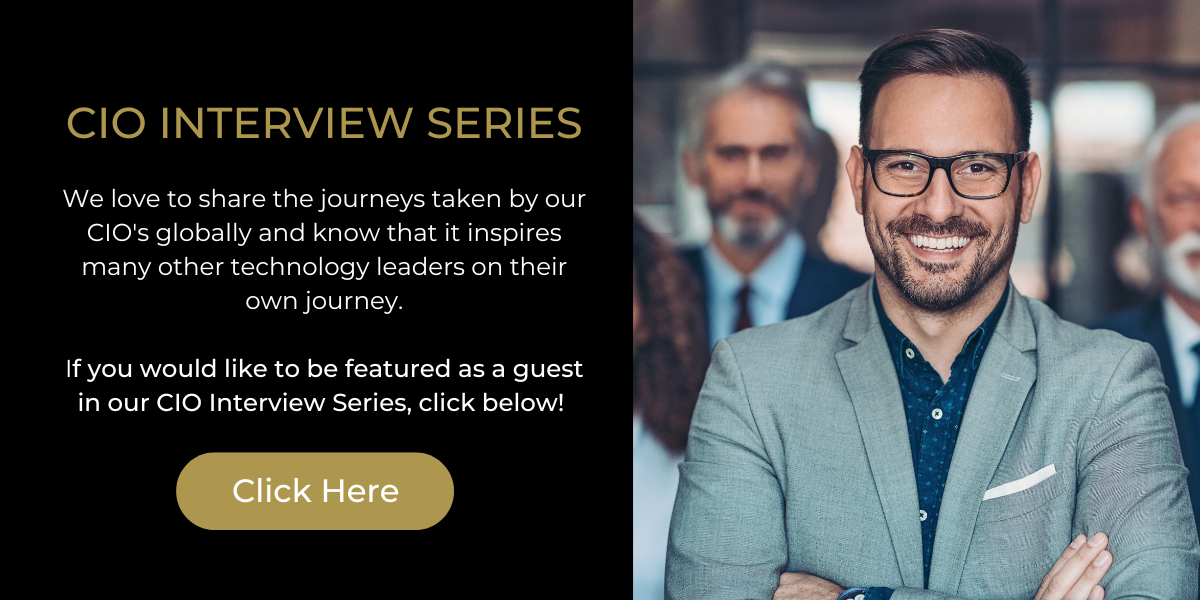Chief Information Officer at Ascot London Group Limited
Can you please provide a little introduction about yourself
Hello. I'm Adrian McGarry, the Chief Information Officer at Ascot London Group. With over twenty-nine years of experience in the IT industry, I have a proven track record of driving digital transformation and innovation. My expertise lies in leveraging cutting-edge technologies to optimise business processes, create cyber-resilience, enhance cybersecurity, and deliver strategic IT solutions that align with our clients' goals.
From our offices in the City of London and Ascot, Berkshire, we lead a talented team, including IT, people operations, and InfoSec professionals, dedicated to ensuring our service provision is robust, secure, and scalable. We are committed to fostering a culture of continuous improvement and staying ahead of industry trends to provide the best possible service to our clients and stakeholders.
What has your journey to your position been like? What path have you taken?
Starting in IT service companies working in the finance sector, my first roles were at the cliff edge of troubleshooting, and I soon found an affinity with networks and security, furthering my capabilities and structuring my learning paths along this route until management of people started to take-over as the greater calling.
Mentoring and building teams of engineers, at first, was a critical time in developing my leadership styles and systems, which led me from strength to strength and eventually from different teams to new companies, where in software houses, I found the building and leading teams of development, support training and operational divisions most exhilarating.
Working throughout many industries in my time as a CIO has been a privilege and a challenge. We came to form Ascot London to lend that experience to many more organisations and help build other organisation's teams, using new methods, sharing best practices, and great strategies.
Has it always been your vision to reach the position you’re at? Was your current role part of your vision to become a tech leader?
Becoming a tech leader was never an end goal; it was a constant evolution of learning, refining leadership strategies and learning from others' mistakes. Yes, we always strive to learn from our mistakes, but watching and learning how other leaders work has always been a great asset. I've led many teams, divisions and organisations, but I am where I want to be as I can share the most with a huge variety of people across a vast array of sectors in some of the best organisations in the world.
Have you had a role model or mentor that has helped you on your journey?
Mentors and role models come and go; I don't like putting people on pedestals as some character trait or other along the way often never entirely aligns with your beliefs or psyche. However, I have been privileged to be taught and trained by some great minds, starting with one of the most diverse thinkers who helped me train my mind, Prof. Norman Luff.
I hear a lot of great quotes these days; one which I like the most is "Great minds, think differently." Norman was the ultimate in getting others to raise their thought process for many people. Many mentors have been the greatest in their respective fields, and many others I've been privileged to have worked in teams with, and it lends back to the "collective thinking" mentality that forms and challenges you as an individual and a leader.
How do you see the role of the technology leader evolving over the next 5 years?
The role of technology leaders, such as CIOs, is expected to evolve significantly over the next five years due to the rapid pace of technological advancements and changing business landscapes. We created Ascot London to help create and aid strategic partnerships and collaboration. Technology leaders are increasingly acting as strategic partners within their organisations, collaborating closely with other departments to drive business goals. Still, this version of a leader is confined within an organisation or a sector and breaking the mould is essential to diverse thinking. The focus on AI and automation has been prevalent throughout my career.
Still, leaders will need to harness these technologies to improve efficiency, enhance decision-making, and create new business opportunities, which includes managing the ethical implications and ensuring responsible AI use. As cyber threats become more sophisticated, technology leaders must prioritise information security and risk processes, implement robust cyber resilience measures, stay ahead of emerging threats, and foster a security awareness culture. There is already a growing emphasis on sustainability and green technology. Leaders will need to innovate to reduce the carbon footprint of their IT operations and support broader corporate sustainability goals. Data-driven decision intelligence, leveraging big data and analytics will be essential.
Technology leaders must ensure their organisations can collect, analyse, and act on data insights to drive business performance and innovation. Overall, the role of technology leaders will become more dynamic and integral to the success of their organisations. They will need to be adaptable, forward-thinking, and part of the executive board discussion to maintain any organisation is proactive in navigating the complexities of the digital age.
What skills do you think leaders of the future will need in order to thrive?
Future leaders will need diverse skills to navigate the complexities of an ever-evolving business landscape. To thrive, I think these are important in the present climate:
Digital Adaptability requires leaders to be proficient with emerging technologies and digital tools, enabling them to leverage data, AI, and other innovations to drive business success. They must also know when to use and how to enable their stakeholders with digital technologies like Artificial Intelligence, Decision Intelligence, and Cyber Resilience.
Strategic Agility, significantly pivoting quickly in response to market changes and using digital and cyber to help you be most agile are always crucial. Leaders will need to anticipate trends and make informed decisions to stay ahead of the competition.
Effective leaders need strong conflict resolution skills to manage and mediate team disputes, fostering a collaborative and productive work environment.
The capacity to persuade and influence others is essential for gaining buy-in from stakeholders, motivating teams, and driving organisational change.
These skills, combined with emotional intelligence, cultural competence, and a sustainability mindset, will equip leaders to thrive in the future.
Is there anything in particular that you would still like to achieve in your career or what is the next step on your journey?
The word "journey" defines a beginning and an end, and "career" is too linear. The best way to frame "what's next?" is always about entrepreneurship. There are always new thoughts, ideas, new technologies, amalgamations, and integrations that you spot as a leader; some need development, and others need the right timing in the social or economic environment to be viable.
What advice would you give to aspiring technology leaders who are just starting their careers?
Aspired technology leaders starting their careers must embrace lifelong learning early. Technology evolves rapidly, so stay curious and continuously update your skills. It's not just about taking courses, attending workshops, and keeping up with industry trends; technologists must ensure you gain the ability to use and learn interfaces intuitively. Learn how well-designed interfaces enable greater user adoption. Build a strong network and connect with mentors, peers, and industry professionals. Networking can provide valuable insights, support, and opportunities for collaboration.
Regularly seek feedback from your team and peers. It will help you grow and improve as a leader. Be Adaptable: the tech landscape is constantly changing. Be open to new ideas, flexible, and ready to pivot when necessary. Prioritise ethics and integrity because, as a leader, your decisions can have significant impacts. Always prioritise ethical considerations and maintain integrity in your actions. Leadership comes with its share of challenges. Stay resilient, learn from setbacks, and keep pushing forward.
"Stay resilient, learn from setbacks, and keep pushing forward."
What role do you see emerging technologies (e.g., AI, machine learning, blockchain) playing in your industry, and how are you preparing for them?
Emerging technologies like AI and machine learning are revolutionising various industries by enhancing efficiency, productivity, and innovation.
Artificial Intelligence (AI) and machine learning (ML) are transforming industries by enabling predictive maintenance, smart manufacturing, and real-time quality control. For instance, AI-driven predictive maintenance allows companies to anticipate equipment failures before they occur, reducing downtime and maintenance costs.
In manufacturing, AI and ML optimise production processes, improve decision-making, and enhance supply chain management.
Blockchain technology offers a decentralised and secure way to record transactions and manage data. It is particularly impactful in industries like finance, healthcare, and supply chain management. By creating immutable records, blockchain ensures transparency, reduces fraud, and enhances data security. But is it an emerging technology? For example, blockchain has been used to track goods for decades in logistics management.
Extended Reality XR, which includes virtual reality (VR), augmented reality (AR), and mixed reality (MR), is creating immersive experiences for training, entertainment, and remote collaboration. As these devices become more available and the maturity of some of the technologies is accepted, I see this as a game-changer.
Green Energy technologies and innovations in energy and IT are crucial for addressing climate change and promoting sustainability. Creating a circular economy, where the use of technology hardware is concerned, and breaking the cycle of waste is essential and must evolve rapidly. We are preparing for this challenge by remanufacturing IT. Cloud computing still has much to learn about its ESG practices and an honest and accurate approach to how each provider calculates its carbon solutions are needed.
How do you measure and communicate the value and impact of technology initiatives to other business leaders and stakeholders?
Measuring and communicating the value and impact of technology initiatives is crucial for gaining support and demonstrating benefits.
Defining clear objectives for your initiatives helps track progress and assess success. Identify relevant key performance indicators (KPIs) that align with your goals, such as return on investment (ROI), user adoption rates, time to value (TTV), and customer satisfaction. Use data analytics to monitor performance and gather insights, tracking usage patterns, system performance, and user feedback. Benchmark your results against industry standards or similar organisational initiatives to gauge performance.
When communicating the value and impact, tailor your message to your audience's interests and level of technical understanding. Focus on how the initiative aligns with business goals and addresses their concerns. Emphasise business outcomes rather than technical details in plain language, discussing how the initiative will drive revenue, reduce costs, improve efficiency, or enhance customer satisfaction. Use visuals like charts, graphs, and dashboards to present data clearly and compellingly, helping stakeholders quickly grasp the impact of the initiative.
Share stories and provide examples of similar successful projects or case studies to illustrate potential benefits and build confidence in the initiative. Keep stakeholders informed with regular updates on progress, challenges, and achievements, as transparency builds trust and keeps everyone aligned. Quantify the benefits in financial terms, making it easier for business leaders to understand the value and make informed decisions.

A big thank you to Adrian McGarry from Ascot London Group Limited for sharing his journey to date.
If you would like to gain more perspective from Tech Leaders and CIOs you can read some of our other interviews here.
June 1, 2025


